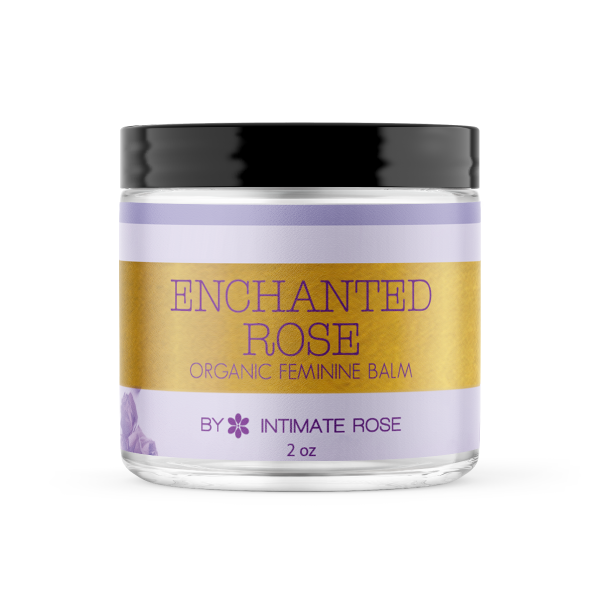Less desire for sex during menopause is common and typically caused by hormone changes, vaginal dryness, stress due to menopausal symptoms, marital difficulties, or a combination of all the above. Studies have shown that when marital discord is not the cause of low libido during menopause, many women worry that their lowered sex drive will result in relationship issues, but few seek help.
The good news is low libido due to hormone changes and other menopause symptoms can be easily treated. Keep reading to understand more about libido, how it is affected by menopause, and what you can do to get it back on track.
What Is Menopause?
Menopause is the term assigned to the stage of life when a woman can no longer reproduce. It is reached when the ovaries have stopped producing estrogen and menstruation has not occurred for 12 consecutive months.
What Is Libido?
Libido, also known as sex drive, is an energy or desire that is powered by the brain and enables humans to think about and anticipate sex. Once initiated, sexual desire generally causes sexual arousal, which typically results in some physical changes, such as:
- More blood flow to the vagina
- An expansion of the upper vagina
- Inflammation of the vulva (external female genitalia)
- An increase in vaginal lubrication
- Amplified heart rate
- Increased blood pressure & faster breathing
What’s The Difference Between Sexual Arousal and Sexual Desire?
Although often confused as being the same thing, sexual desire and arousal are different. Sexual desire is essentially libido, and arousal is the body’s response to that desire. Women may experience a lack of sexual desire during menopause, for instance, but if aroused they can still enjoy sex as much as they did before menopause.
On the other hand, if dyspareunia (painful sex) is experienced, or if sex with a partner is no longer satisfying, women will typically experience a lack of desire and no arousal.
Menopause and Low Libido: How Common Is it?
Even though it’s perfectly normal for both men and women to feel less desire for sex as they age, studies have concluded that the effects of changing hormones during menopause can further lower women’s libido.
According to several studies and surveys, 40-50% of women going through perimenopause or menopause experience low libido and the distressing emotions that come with it. Unfortunately, even though low sex drive in menopause is easily treated, only 25% of women seek help.
If you’ve noticed that your sex drive isn’t what it was before perimenopause or menopause, it’s helpful to speak with your partner about what you’re experiencing. With their support, some helpful tips, and the treatment options outlined below, you’ll feel much better about navigating through the journey of low menopausal libido together.
How Does Menopause Affect Women’s Sex Drive?
Despite menopause being a natural phase of life that signals the end of the reproductive stage, changing hormone levels can result in over 34 major menopause symptoms. Even though every woman will not experience all symptoms, each woman undoubtedly undergoes physical, psychological, and physiological changes that can be distressing.
As hormone levels like estrogen and progesterone (and even the small amounts of testosterone in females) begin to drop in perimenopause, women can experience a variety of symptoms that lower their energy levels and sex drive.
- Night sweats can make it more difficult to sleep soundly, leading to fatigue and increased stress the following day, both of which can impact libido
- Physical changes during perimenopause and menopause can leave women feeling less attractive or less sexy
- Lowering estrogen levels typically means less vaginal lubrication, which renders the vaginal walls drier (vaginal atrophy). Lowered estrogen also makes the vaginal walls thinner and less elastic. A drier, thinner, and less pliable vagina can lead to friction and micro-tears during sex and result in dyspareunia (painful sex)
- When painful sex is experienced the fear of more pain can result in a lowered libido for many women, sometimes to the point that the vaginal muscles tighten at the mere thought of penetration
- A lack of natural lubrication can mean it takes longer for women to orgasm and when enough time or attention is not given to attaining orgasms by their partner, women’s libido can drop
- Testosterone plays a small role in the female sex drive and although its gradual drop during perimenopause isn’t usually significant enough to affect women’s libido, it can resonate for some women
Even though menopause symptoms can undoubtedly contribute to a lowered libido, the status of women’s intimate relationships can also play a role. For example, experiencing relationship issues such as; no longer feeling attracted to a partner, a lack of communication, infidelity, resentment, frustration, anger, or boredom.
How to Improve Low Sex Drive During Menopause
When it comes to improving a low sex drive during menopause, several approaches are likely involved. These can include:
Talk About It
Speaking with your partner about what you’re going through can be both relieving and helpful. If partners don’t understand menopause or your symptoms, they may take your lack of sexual desires personally, and talking about it can help avoid relationship issues. As the saying goes, it takes two to tango, and being aware of one another's needs can make sex more enjoyable for both parties.
If you don’t feel like you can speak openly with your partner about low libido, consider speaking with a relationship or sex therapist who can give you tips to improve intimacy and communication.
Use Lube
Vaginal dryness (atrophy) due to low estrogen levels is a common complaint from women going through perimenopause or menopause. If left untreated, it is known to cause painful sex (dyspareunia). As discussed above, experiencing painful sex can create a fear of further pain and result in a lowered desire for future intercourse.
Applying a water-based personal lubricant before intercourse can relieve the friction associated with vaginal dryness and make sex much more enjoyable. If you suffer from low libido, your partner can also help you to become sexually aroused by gently applying the lubricant for you as a form of foreplay. Using lube for vibrators and masturbation can also help improve natural lubrication and sexual desire, and they can be used with your partner, or alone.
Oil-based and silicone-based lubricants are known to affect the vaginal pH and upset the delicate balance of friendly and unfriendly bacteria in the vaginal microbiome. Therefore, female health experts recommend using water-based lubes, like this one from Intimate Rose, to keep the vagina healthy.
Loosen Things Up
Painful sex can sometimes require more than lube. For some, dyspareunia can trigger a long-term psychological connection between sex and pain. Women who experience this connection can experience a tightening of the vaginal muscles and vaginal opening at the mere thought of future sex. Sometimes the vaginal muscles become so tight that penetration is impossible.
If this is something that sounds familiar, schedule an appointment with a gynecologist or pelvic health physical therapist to ask if vaginal dilation therapy is right for you. Designed to relax tight vaginal muscles and improve libido, the incrementally increasing sizes in vaginal dilator sets can slowly re-introduce women to painless penetration.
Vaginal dilators are made from plastic or medical-grade silicone; however, feedback suggests that those made from medical-grade silicone are more body-safe, comfortable, and effective for vaginas of all ages and sizes. Intimate Rose sells one of the most affordable sets of medical-grade silicone FDA-approved dilators, and their range of sizes in a set outnumber any other supplier.
Hormone Therapy
Hormone therapy (HT), also known as estrogen therapy (ET), is a form of medication prescribed to treat several menopause symptoms, including vaginal dryness and libido. It is typically taken orally or applied topically as an estrogen gel to rebalance hormone levels.
However, re-introducing estrogen to the body when it is naturally declining during perimenopause can have serious side effects. Increased estrogen at this time of life can increase the risk of breast cancer and uterine cancer, as well as blood clots and heart disease.
That said, dropping estrogen levels can also lead to a loss of bone density and an increase in bone fractures later in life. To counteract this, and safely relieve menopause symptoms like low libido, vaginal dryness, hot flashes, and mood swings, phytoestrogens are just as effective.
Hormonal and Non Hormonal Menopause Relief

Phytoestrogens
Phytoestrogens are found in a variety of fruits and vegetables and have been used to treat female hormone imbalances for centuries. They are considered nature’s version of selective estrogen receptor modulators (SERMs), which manage how estrogen supports the body.
Essentially, phytoestrogens bind to estrogen receptors, imitate SERMS, and trick the body into behaving as if estrogen is present and abundant, even when it’s not.
Even though most humans consume phytoestrogens through various fruits and vegetables every day, a regular and sustained amount is recommended to relieve menopause symptoms. According to customer and expert feedback, Vitex (Chasteberry) Supplements from Intimate Rose are one of the most powerful and effective phytoestrogen supplements on the market.
Find Ways to Relax & Relieve Stress
The changes experienced during perimenopause and menopause can often result in women feeling more anxious and stressed, both of which can diminish sexual desire. Taking time to relax, relieve stress, and accept what your body is going through can improve your overall sense of happiness and boost libido.
Great ways to relax and relieve stress include; taking a walk, listening to your favorite music, dancing, practicing yoga, and meditation. Creating a daily routine for relaxation, stress release, and acceptance has helped many women through this stage of life.
Pelvic floor Investigation
As the base of the core muscles and support for the pelvic organs, including the vagina, a strong pelvic floor is essential for women’s overall health and stability. However, pregnancy, childbirth, pelvic injuries, and certain surgeries can all have an impact on the pelvic floor muscles and cause issues later in life.
For some women, these situations can result in tight pelvic floor muscles while for others they weaken. Both tight and weak pelvic floor muscles can have an impact on how sex feels and ultimately affect libido.
If you think this could apply to you, schedule a consultation with a pelvic physical therapist for advice on relaxing or strengthening your pelvic floor. Kegel weights are helpful to re-strengthen weak pelvic floor muscles and vaginal dilators are regularly used to relax tight pelvic floor muscles.
Relationship Health
Although menopause can result in several symptoms that contribute to a lower libido, a lack of sexual desire can also stem from relationship issues or marital difficulties. If you sense that this applies to you, consider speaking with a relationship therapist, communicating more openly, or spending more quality time together to improve the health of your relationship.
If you feel like the relationship is no longer healthy, however, look after your mental and physical health by discussing it openly with your partner.

Get your personalized HRT plan!

Get your personalized HRT plan!
Conclusion
Low libido or reduced sexual desire during menopause can be caused by low estrogen levels and painful sexual experiences due to vaginal dryness, less vaginal elasticity, and thinner vaginal walls. However, it can also arise due to a lack of attraction for your partner or relationship issues.
To counteract the effects of perimenopause and menopause on your sexual desire, hormone-balancing phytoestrogens are a safe, powerful, and natural alternative to hormone therapy. Communicating with your partner, trying more foreplay, and using personal lubricants for sex, masturbation, and vibrators are also helpful. Some couples also benefit from speaking with a relationship therapist.
References
Verywell Health – What is Libido? - https://www.verywellhealth.com/what-is-libido-5084040
Science Direct - Estrogen’s Effects on the Female Body - https://www.hopkinsmedicine.org/health/conditions-and-diseases/estrogens-effects-on-the-female-body
Research Gate – Menopause: Understanding the Impact on Women and their Partners - https://www.researchgate.net/publication/338627168_Menopause_-_Understanding_the_impact_on_women_and_their_partners
National Library of Medicine - Management of Libido Problems in Menopause - https://www.ncbi.nlm.nih.gov/pmc/articles/PMC6220606/
National Library of Medicine - Efficacy of phytoestrogens for menopausal symptoms: a meta-analysis and systematic review - https://www.ncbi.nlm.nih.gov/pmc/articles/PMC4389700/

Get your personalized HRT plan!












